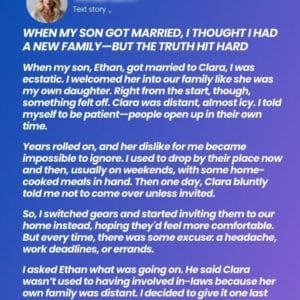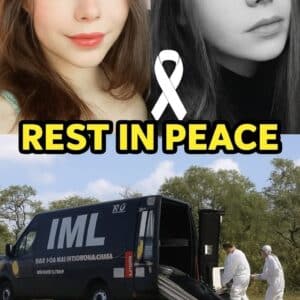I was down to twenty bucks and three packets of ramen when an unknown number lit up my phone. I almost let it die in voicemail, but something in me—hope, stupidity, fate—made me answer.
“Ms. Miller? This is Adrian Whitcomb, attorney,” said a crisp voice that sounded like it wore cufflinks. “I’m calling about the estate of Diane Miller.”
My aunt. The family ghost. My mother’s estranged sister who’d lived alone in the sticks and died quietly a month ago. We hadn’t seen her in twenty years. I braced for forms to sign, fees to pay, anything that would cost money I didn’t have.
Instead: “Your aunt left you a substantial sum.”
I sat on the edge of my mattress, heart in my throat. Substantial, as in debt-gone, car-fixed, life-changed—then he cleared his throat.
“There is a condition. Unusual. In a sealed addendum to be read only in your presence.”
Of course there was a catch. There’s always a catch.
His office lived in a glass tower that made my bus-frayed clothes look louder than they were. Marble. Murmur. A receptionist who smiled with only her mouth. Adrian matched the decor—razor part, perfect tie, the kind of expensive calm that didn’t squint at fluorescent lights.
He slid an envelope between us like it might bite. “Per your aunt, I must read this aloud. Only to you.”
He broke the seal. “You must live in Diane Miller’s home—‘The Old Mill House’—for one continuous year. You cannot sell or rent it. You must maintain it. And you must keep a journal of your experiences. The journal will be in a hidden compartment in her desk.”
A year. In a stranger’s house. With a journal.
“If you accept and fulfill the spirit of the condition,” he said, “the inheritance is yours. If not, it goes to conservation charities.”
He placed a heavy antique key in my palm. It felt like holding a door.
I said I’d do it.
The Old Mill House was exactly what the name promised and more—a fading Victorian hugged by wild honeysuckle and a lazy stream, with a weathered waterwheel permanently at rest. The gravel road in was more suggestion than road. GPS gave up. The air was damp and green; the whole place smelled like rain and old paper.
Inside, sheet-draped furniture, tall windows, dust motes skating through light. In the back, a small study watched the mill. The oak desk was scarred and stubborn, but a loose panel gave beneath my fingers. Out slid a leather journal and a small silver key.
Her handwriting was elegant and steady. Notes on the first frost, the flash of a red-tailed hawk, the way the stream “sang lower in July.” There was a pressed flower, brittle as breath. The silver key opened a small box in the desk: an antique compass, a perfect feather, and a photograph of a young Diane laughing at the camera, shoulder-to-shoulder with a man I didn’t know.
The first weeks were an exercise in quiet. I jumped at every beam’s groan, cooked like a pioneer, missed the corner bodega like a friend. I wrote stiffly in the journal, listing weather and chores because I didn’t know what else to say. Then the house started speaking back.
I learned the paths where the deer cut through the brush. The names of the wildflowers that burned up through last year’s leaves. The exact shade the hills turned at sunset. I carried the compass and got lost on purpose in places you couldn’t really. The journal shifted from “Saw a fox” to “I’m lonely but it’s not empty here,” then to “I think I understand why she stayed.”
Cleaning out a pantry, I found a stack of hidden canvases—Aunt Diane’s paintings—saturated and alive. The mill in spring, the stream in fog, a stand of birch trees lit from within. The “eccentric recluse” had hands full of color.
In the attic: letters ribbon-tied. Not love letters—field notes to botanical societies, careful correspondence with the historical commission. She cataloged plants, tracked migratory birds, recorded the mill’s history. The man in the photo finally got a name from a yellowed clipping tucked in a book: Arthur Finch, local environmentalist, dead in a hiking accident. They’d been engaged. My aunt hadn’t vanished out of oddity. She’d been shattered. She’d rebuilt an entire life around the land they loved.
Suddenly, her condition wasn’t a game. It was an invitation to see what she saw.
I wrote like a person learning a language. Then the stream changed after a storm, and a glint of metal blinked out of the peeled-back bank. I dug it free: a waterlogged wooden box, carved and stubborn. Inside: a tarnished locket engraved D.M. + A.F., a tiny mill etched on the back. Beneath it, a map.
Hand-drawn, precise, the Old Mill House property rendered like a love letter. An X near the waterwheel. In the margin, in Diane’s script: Our dream, our future.
The next day I hacked through a thicket near the wheel and dug until my spade rang against metal. A weather-beaten box the size of a carry-on. The small silver key from the desk turned the lock.
Cash, packaged against time. Not a cartoon mountain—the careful kind, bundled, dry, intentional. And blueprints. Reports. Correspondence. All stamped with two names: Diane Miller and Arthur Finch.
They had designed an ecological restoration for the valley: daylighting sections of stream, removing invasives, replanting natives, reintroducing species, building a sanctuary. It was all there—phasing, budgets, maps, letters from universities. Tucked into a blueprint roll was a letter addressed to “My Dearest Successor.”
Diane’s handwriting had softened but not wavered. She told me the official inheritance was bait—money to get me to the house, time to let the place work. The real inheritance was this: the work, the love, the plan. She’d kept separate funds safe for decades, waiting for someone to carry it. She’d watched me from a distance—through town acquaintances, a story of a small donation I’d made to an animal shelter when I couldn’t afford to. “I needed someone with a true heart,” she wrote. “Someone who understands wealth isn’t accumulation but purpose.”
I cried alone in that study, the mill’s dead wheel a dark circle in the window. The journal stopped being homework. It became a conversation with her.
The last months of my required year were full of lists and calls. I devoured the plans, emailed the institutions she’d written, sat with the town clerk until we were both cross-eyed. I met a biologist who knew Arthur. We walked the property, and he told me where the brook trout used to run like silver.
When Adrian returned to review my journal, I handed him more than seasons and sightings. He read in his careful way, emotion passing under his professional surface like fish. I told him about the hidden cache. He admitted he’d suspected there was “more,” per Diane’s… personality. She’d insisted I discover it myself.
The money in the will unlocked my life. The money in the box unlocked my purpose.
I never moved back to the city. I hired local crews, contracted experts, sat through town halls where old men started skeptical and ended up offering backhoes. We pulled knotweed until our hands throbbed, replanted with milkweed and joe-pye and bluestem. We repaired the banks, set stones where the water wanted to go, re-naturalized a stubborn culvert. Kids came on Saturdays to plant saplings and eat too many cookies. The stream cleared. Dragonflies stitched the air. A great blue heron started showing up like a benediction.
We restored the mill wheel—not to grind, but to turn slow, catching light, a symbol of movement returned. The town, which had rolled its eyes at the “weird woman in the green house,” began to say “our mill” again. The bakery adjusted hours to feed volunteers. The high school science teacher brought students to test the water and write lab reports that read like poems.
My mother drove out one Sunday with a pie and an apology. She cried at the paintings. We stood under the old oak by the pond and talked about how wrong we’d been.
When my year ended, I handed Adrian a journal swollen with leaves and plans and mud fingerprints. He closed it with both hands. “Ms. Miller,” he said, “your aunt would be… pleased.” It felt like a blessing.
I still think of the girl who almost didn’t answer an unknown number and the woman who pressed a flower between pages so someone years later would know she’d seen it. I keep the compass on the desk, the locket in a drawer I open often. The Old Mill House is no longer a condition; it’s home. The project is no longer a plan; it’s a life.
People call it an inheritance. I call it a rescue—of a stream, of a valley, of a stranger who didn’t know she needed something to love big enough to rebuild her around.





